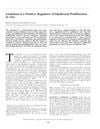Search
for
Sort by
Research
180-210 / 1000+ resultsresearch Hair Loss Caused by Gain-of-Function Mutant TRPV3 Is Associated with Premature Differentiation of Follicular Keratinocytes
A gene mutation causes early keratinocyte maturation leading to hair loss in Olmsted syndrome.

research Urokinase Is a Positive Regulator of Epidermal Proliferation In Vivo
Urokinase, a type of protein, helps skin cells multiply faster, especially in newborn mice.

research Evaluation of Apoptosis Regulatory Markers in Androgenetic Alopecia
Apoptosis may contribute to hair loss in androgenetic alopecia.

research Role of Bulge Epidermal Stem Cells and TSLP Signaling in Psoriasis
Blocking TSLP reduces skin inflammation and cell overgrowth in psoriasis.

research The Topical Penta-Peptide Gly-Pro-Ile-Gly-Ser Increases the Proportion of Thick Hair in Japanese Men with Androgenetic Alopecia
GPIGS peptide increases thick hair growth in balding Japanese men.

research L-Carnitine-L-Tartrate Promotes Human Hair Growth In Vitro
L-Carnitine-L-tartrate may help hair grow and prevent hair loss.

research Epithelial Cells in the Hair Follicle Bulge Do Not Contribute to Epidermal Regeneration After Glucocorticoid-Induced Cutaneous Atrophy
Hair follicle bulge cells don't help skin regrow after glucocorticoid damage; interfollicular epidermis cells do.

research Effect of Poly(3-Hydroxybutyrate-Co-3-Hydroxyvalerate) Nanofiber Matrices Cocultured With Hair Follicular Epithelial and Dermal Cells for Biological Wound Dressing
PHBV nanofiber matrices help wounds heal faster when used with hair follicle cells.
research DNA Damage-Inducible Transcript 4 Is an Innate Surveillant of Hair Follicular Stress in Vitamin D Receptor Knockout Mice and a Regulator of Wound Re-Epithelialization
Vitamin D receptor is important for regulating hair growth and wound healing in mice.

research Overexpression of Nanog in Amniotic Fluid-Derived Mesenchymal Stem Cells Accelerates Dermal Papilla Cell Activity and Promotes Hair Follicle Regeneration
Nanog gene boosts stem cells, helps hair growth, and may treat hair loss.

research Effects of 1α,25-Dihydroxy-Vitamin D3 and Calcipotriol on Organotypic Cultures of Outer Root Sheath Cells: A Potential Model to Evaluate Antipsoriatic Drugs
Vitamin D compounds may help treat psoriasis by promoting skin cell differentiation.

research A Human Folliculoid Microsphere Assay for Exploring Epithelial-Mesenchymal Interactions in the Human Hair Follicle
HFMs can help study hair growth and test potential hair growth drugs.
research Establishment of an Efficient Primary Culture System for Human Hair Follicle Stem Cells Using the Rho-Associated Protein Kinase Inhibitor Y-27632
A new method using Y-27632 improves the growth and quality of human hair follicle stem cells for tissue engineering and therapy.

research A Hot New Twist to Hair Biology: The Role of TRPV1 in Human Hair Growth Control
Capsaicin, found in chili peppers, can slow down hair growth by affecting skin cells and hair follicles.

research Hair Growth Promoting Effect of Trichoxidil: A New Natural Compound for Hair Loss
TrichoxidilTM could be a promising new treatment for hair loss.

research Ganoderma Lucidum Extract Attenuates Corticotropin-Releasing Hormone Induced Cellular Senescence in Human Hair Follicle Cells
Ganoderma lucidum extract may help treat stress-related hair loss.

research Vitamins and Their Derivatives Synergistically Promote Hair Shaft Elongation via PlGF/VEGFR-1 Signalling Activation
Certain vitamins and their derivatives can help hair grow longer by activating specific growth signals.
research Corticotropin-Releasing Hormone and the Skin
CRH in the skin acts like the body's stress response system, affecting cell behavior and immune activity.
research C/EBPα and C/EBPβ Are Required for Sebocyte Differentiation and Stratified Squamous Differentiation in Adult Mouse Skin
C/EBPalpha and C/EBPbeta are crucial for normal skin and oil gland cell development in adult mice.

research Hair Sciences: The Hair Cycle Discussed with Dr. Gilliam Westgate
Androgens affect hair growth and shedding, with genetic and non-genetic factors influencing baldness.

research Molecular Biology of Hair Morphogenesis: Development and Cycling
Understanding hair growth involves complex interactions between molecules and could help treat hair disorders.

research Biology of Human Hair: Know Your Hair to Control It
Understanding hair biology is key to developing better treatments for hair and scalp issues.

research Molecular Mechanisms of Androgenetic Alopecia
AGA causes hair loss by shrinking hair follicles due to DHT binding, and can be treated with finasteride and minoxidil.

research From Telogen to Exogen: Mechanisms Underlying Formation and Subsequent Loss of the Hair Club Fiber
Hair shedding is an active process that could be targeted to treat hair loss.

research Prolactin: A Novel Neuroendocrine Regulator of Human Keratin Expression In Situ
Prolactin affects the production of different keratins in human hair, which could lead to new treatments for skin and hair disorders.

research Deciphering the Functions of the Hair Follicle Infundibulum in Skin Physiology and Disease
The hair follicle infundibulum plays a key role in skin health and disease, and understanding it better could lead to new skin disease treatments.

research Current and Potential Agents for the Treatment of Alopecia Areata
Current and future treatments for alopecia areata focus on immunosuppression, immunomodulation, and protecting hair follicles.

research Nerve-Derived Sonic Hedgehog Defines a Niche for Hair Follicle Stem Cells Capable of Becoming Epidermal Stem Cells
Nerve signals are crucial for hair follicle stem cells to become skin stem cells and help in wound healing.

research Platelet-Rich Plasma for Hair Loss
Platelet-Rich Plasma (PRP), a protein-rich extract from a patient's blood, shows promise in improving hair density, thickness, and quality, but the best method of use and number of treatments needed for noticeable results are still unclear.